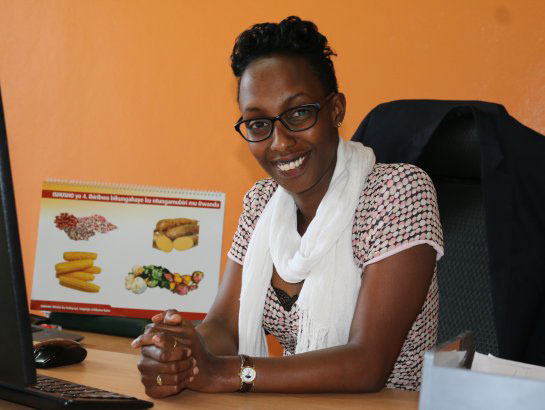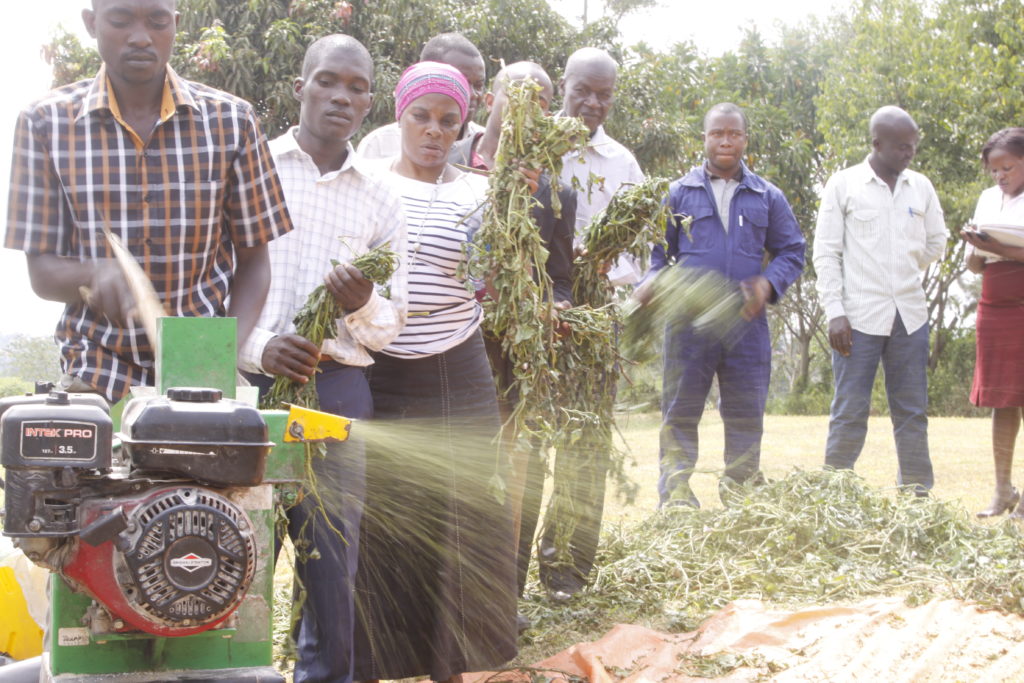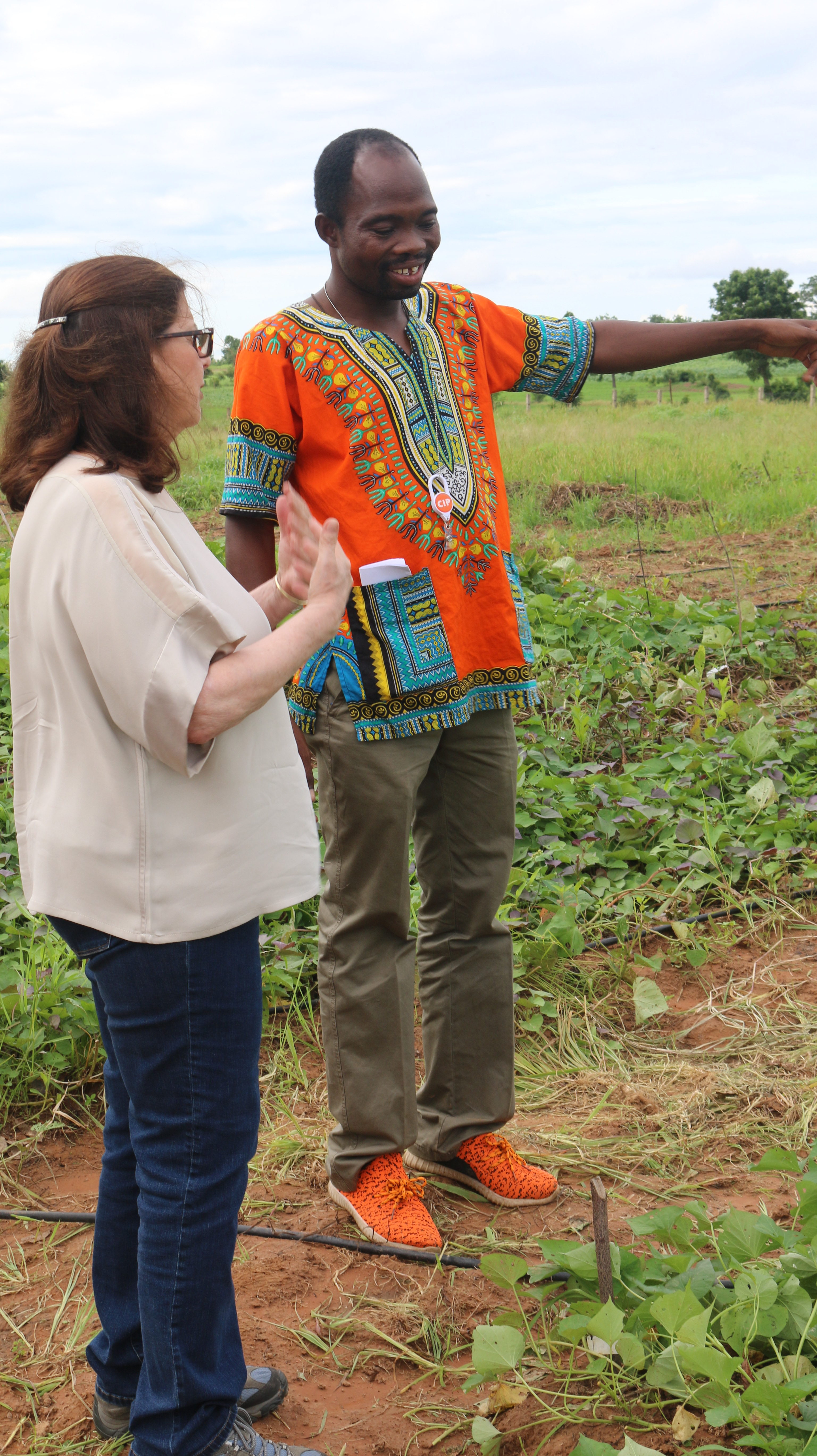HIGHLIGHTING CONTRIBUTIONS BY CIP EARLY CAREER RESEARCHERS
WORKING ON POTATO AND SWEET POTATO RESEARCH
HIGHLIGHTING CONTRIBUTIONS BY CIP EARLY CAREER RESEARCHERS
WORKING ON POTATO AND SWEET POTATO RESEARCH
From Kenya, the Africa hub of the International Potato Center (CIP), meet Dinah Borus. She is a Field Coordinator, based in Eldoret, working under the Accelerated Value Chain Development Project, potato value chain. Dinah works closely with potato farmers in the North Rift of Kenya teaching them new technologies, such as use of rooted apical cuttings as starter material for seed production, to enhance productivity.
Her vision is to see farmers having high yields and earning good income. Watch her story below
In Rwanda, Maria Grace Nkundabombi is living her dream as a nutritionist working on the award winning orange-fleshed sweet potato (OFSP) project.

“I have always wanted to do something meaningful, something that helps to improve the community as a whole. This vitamin A-rich sweetpotato, along with high-iron beans and other biofortified nutritious crops, promise to do just that,” says Maria Grace confidently. These crops make important micronutrients easily accessible to everyone, especially the poor who live in rural areas and depend entirely on agriculture for a living.
Read her story here: Defying convention to pursue science.
In Ghana, Obaiya Utoblo, a PhD student at the West Africa Center for Crop Improvement (WACCI), University of Ghana is conducting research on sweetpotato with a focus on drought tolerance. This is a collaborative work with CIP-Ghana and the Genomic Tools for Sweetpotato project from North Carolina State University (NCSU). She notes:
With present climatic global challenges to food production, we hope our findings can contribute to breeding for drought tolerant sweetpotato in Ghana and ultimately enhance food security.
From Uganda, Sarah Mayanja, is a Research Associate supporting value chains, marketing and gender research in SSA.
I train and support project research teams in value chain development, mainstreaming gender in post-harvest and value chain research. I have also developed and adapted gender analytical tools, guides and strategies, she says.

In Mozambique, Fishua Dango will graduate with a BSc degree in Agriculture this year from the Universidade Pedagogica de Mocambique. She works closely with 2016 World Food Prize co-winner and CIP’s Senior Sweetpotato Breeder for sub-saharan Africa & Asia, Dr. Maria Andrade.
Dr. Andrade notes that Fishua has been the connecting link between botanical seed from the crossing program and field evaluations. She is responsible for conservation of true botanical seed, breeding clones and establishing seedling nurseries in the greenhouses at the beginning of each breeding cycle.
In Kenya, Ethel Webi is part of a team working towards a solution for bacterial wilt in potato. Her speciality is in Genomics and Molecular Biology.
Science is interesting and offers solutions to everyday problems, says Ethel.
She enjoys science because it helps the society and changes lives through its inventions and innovations.
Sometime last year, we profiled Dr. Erna Abidin and brought you her sweetpotato love story. On this occasion of women and girls in science, we share this story once more. Follow it below:
Dr. Putri Ernawati Abidin is based in Ghana. She was lead for the recently completed Jumpstarting Orange-fleshed Sweetpotato in West Africa project through Diversified Markets Project that was funded by Bill and Melinda Gates Foundation. In just 2.5 years, Jumpstarting helped more than 117,000 households access OFSP in Ghana, Nigeria, and Burkina Faso.
While others wear their love on their sleeves, Erna wears hers on her fingernails. Whenever she goes to visit communities, she’s clad from head to toe to hand, in ‘OFSP’ orange. CIP has turned the telltale color of OFSP into a brand as an advertisement of the health benefits of OFSP.

“When I talk I say look at my nails even they are orange,” she says. “Sometimes we work with illiterate people. You cannot give them texts, but they can associate that orange means beta-carotene.
Read more about Erna’s sweetpotato love story and how she is making a difference here: sweetpotato, a love story.
In Peru, Gabriela Burgos of our Genetics, Genomics, and Crop Improvement program, dedicates herself to helping counteract rampant levels of anemia by developing zinc and iron biofortified potato. The iron found in potato is more absorbable than the iron found in other vegetable sources. She hopes that in two or three years time families will see their levels of malnutrition and anemia drop due to consumption of biofortified potatoes.
Borlaug Fellow, Betty Flores, was thrilled to have the opportunity to use her fellowship to deepen her research on potato virus. Part of a research support unit that has been working on virus diagnostics, Betty relishes the opportunity that the Borlaug fellowship provides to create cross-cultural links with other institutions. She hopes that her research helps broaden understanding of the diversity of Potato Virus Y (PVY) and provides insights into its evolution using the next generation sequencing technology (NGS). She shares with us what the fellowship means to her.